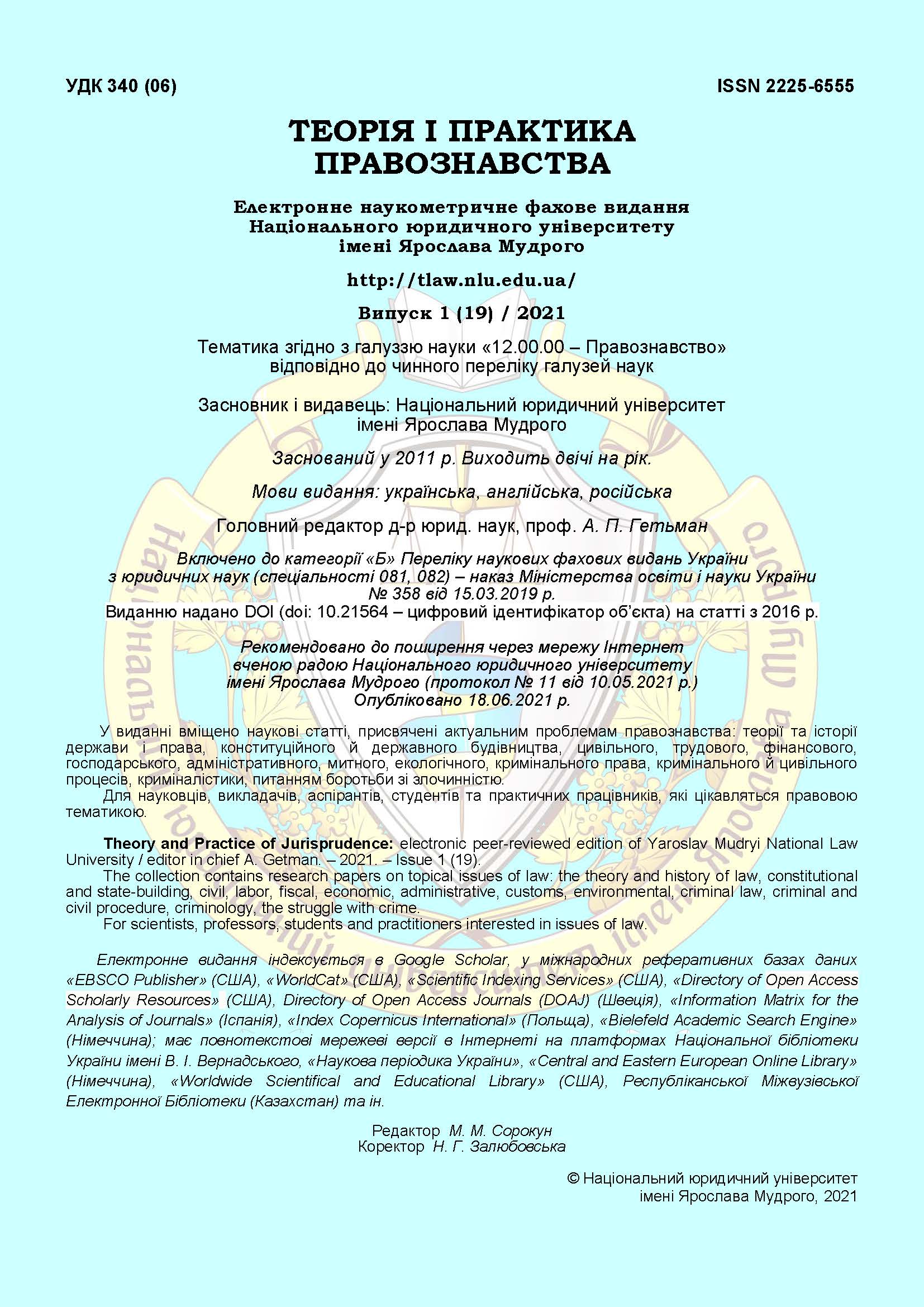The main stages of the formation of institutions of state power and law of Ancient China
DOI:
https://doi.org/10.21564/2225-6555.2021.19.224744Keywords:
Shang (Yin) Western Zhou , Eastern Zhou , Chunqiu , Zhangguo , Confucianism , legalism (Legism) Li Kui , Fa jing , Qin , Ying Zheng , Qin Shihuang , Li Xi , Shang Yang , Liu Bang , Western Han , Shizhna Han , the uprising of the Red Eyebrows and the Yellow Bands , Wang ManAbstract
The article is devoted to the generalizing given the principles of power, management and development of law, formed at the initial stage of the formation of Chinese civilization. The chronological framework of the origin of the Chinese civilization in the ancient period and the main periods of the history of Ancient China are determined. The main features of the despotic form of government, the stages of the feudal hierarchy and the hierarchy of higher dignitaries, the principle of transferring the main political and legal principles from one dynasty to another, the importance of the reforms of Shang Yang and Wang Man in the process of strengthening the central government are analyzed.
Against the background of the study of significant monographic literature, conclusions were drawn about the formation of the Qin Empire as a pivotal event in the history of Ancient China. The lack of balance in the repressive and permissive policy caused widespread discontent among the masses and a wave of large-scale peasant uprisings, which from time to time destroyed the power of the dynasties. The consequence was the political disintegration of Ancient China. The key idea around which the state and law are formed is the idea of harmony between heaven, earth and people and the observance of natural laws. It is from the period of the ancient Chinese dynasties that the doctrine of Confucianism has been the foundation of the Chinese society and has become a kind of quintessence of Chinese civilization.
References
Harper, D. (2005). The National Geographic Traveler. Kitaj. Moscow: AST; Astrel’ [in Russian].
Strani i narodi. (1982). M.I. Sladkovskij (Ed.). Moscow: Mysl’ [in Russian].
Adamchik, V.V., Adamchik, M.V., Badan, A.Net al. (2004). Istoriya Kitaya. Minsk: Harvest [in Russian].
Vasil’ev, L. (2015). Kul’ty, religii, tradicii v Kitae. Moscow [in Russian].
Vasil’ev, L.S., Lapina, Z.G., Meliksetov, A.V. et al. (2002). Istoriya Kitaya. Moscow: Izd-vo MGU, Vysshaya shkola [in Russian].
Enciklopediya stran mira. (2004). N.A. Simoniya et al. (Eds.). Moscow: Ekonomika [in Russian].
Sovetskaya istoricheskaya enciklopediya. (Vols. 1–16; Vol. 2). E.M. Zhukov (Ed.). Moscow: Sovetskaya enciklopediya, 1973–1982 [in Russian].
Lyove, M. (2005). Kitaj dinastii Han’. Byt, religiya, kul’tura. Moscow: Centrpoligraf [in Russian].
Syma, Cyan’. Istoricheskie zapiski. Shi Czi. Komentarij 29. URL: http://www.vostlit.info/Texts/Dokumenty/China/I/Syma_Tsjan/Tom_VII/text74.phtml ; http://www.abirus.ru//content/564/623/626/14338/14369/14403/14514/14555.html [in Russian].
Vasil’ev, L.C. (2006). Drevnij Kitaj. Period Chzhan’go (V–III vv. do n.e.). Moscow: Vostochnaya literatura, RAN. URL: http://oldevrasia.ru/library/Vasilev-L-C-_Drevniy-Kitay--Tom-3--Period-CHzhango--V-III-vv--do-n-e--/52 [in Russian]..
David, R., Zhoffre-Spinozi, K. (1999). Osnovnye pravovye sistemy sovremennosti. Moscow: Mezhdunarodnye otnosheniya, [in Russian].
Downloads
Published
How to Cite
Issue
Section
License
Copyright (c) 2021 Lyzohub V. A.

This work is licensed under a Creative Commons Attribution 4.0 International License.




